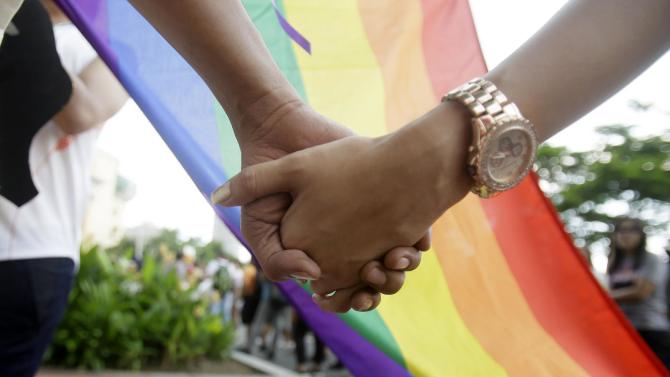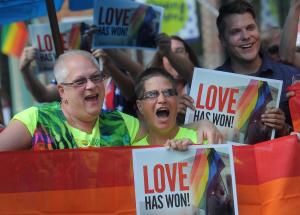From Pambazuka News, No. 732.
Soweto Declaration
From the 5th Africa Unity for Renaissance Conference
24/6/2015

cc SOGV This
Declaration contains some of the salient ideas from delegates who
hailed from across the continent, as well as from the rest of the world,
to articulate what is required for the creation of a united, liberated,
renascent and prosperous Africa.
I. PREAMBLE
The 5th
Africa Unity for Renaissance Conference was held in
South Africa
from
22 to
25 May 2015 in Soweto. The decision to hold the conference
in
Soweto, as well as to name this declaration after it, is symbolic of
the ‘shift in the geography of reason’ that is required to bring about
positive change given the realities of persistent inequitable spatial,
economic and social relations in Africa. It is also befitting to
remember Soweto’s sacrifice and rich history of resistance against
apartheid. Delegates that hailed from across the continent, as well as
from the rest of the world joined together with the South African
participants in articulating what is required for the creation of a
united, liberated, renascent and prosperous
Africa.
Each African Unity for Renaissance Conference has sought to capture and
bring together some of the insightful articulations and deliberations
made over three days into declarations, which have previously been
called the
Tshwane Declarations, and to disseminate the declaration to
reach key thought and policy leaders. The Third
Tshwane Declaration was
delivered to all the delegates present at the
OAU/AU Jubilee celebration
in
Addis Ababa, Ethiopia.
The organising partners from
South Africa have worked consistently and
with full collaboration in order to run these series of African Unity
for Renaissance Conferences
(AUR) with the clear objective of generating
Pan-African education for the creation of substantive change to
re-shape with unity and renaissance the free African future. They have
now been invited to continue this work by formally organising
themselves, as permanent network members and long-term collaborators,
representing a diverse vitality of perspectives, under the name of the
Africa Unity for Renaissance Network
(AURNET). This galvanisation of
these series of conferences into the Africa Unity for Renaissance
Network
(AURNET) is necessitated by the sincerity and commitment
required to not only articulate but also to create the attainable
reality of a strong and united Africa, where Africans are enabled to
make real the futures that they wish to see for themselves, through
their own immense strength, wisdom, collaboration, shared vision,
project and sustainable solidarity. A true united African agency is
still waiting to be made free from all kinds of external influences.
The
5th Africa Unity for Renaissance Conference is also held at the time
of the Diamond Jubilee of the Bandung Conference that created the
non-alignment and third world route for stable and peaceful world order
free from the domination of superpowers that created the Cold War. The
world is still not secure, stable, predictable, peaceful, just, fair and
sustainable. There is no end of history or clash of civilisations. What
is missing is a real new history and civilisation to create a fully
humanity anchored world. It is time to seize the moment in order to
contribute by re-rooting humanity into the rich values of
Africa to
create a new history, culture and civilisation for peaceful co-existence
for all in the world. The work that the
AURNET will promote in the
years to come with the African Unity for Renaissance Conference can
provide the platform, space and road to produce through research the
type of knowledge that will enhance a better understanding of how we can
create a better future indeed for
Africa and the rest of the world.
The 5th Africa Unity for Renaissance Conference in Soweto was symbolic
of this, as it worked against the stigmatisation of the area as one that
is supposedly
‘high risk’ and sought to send the message that knowledge
of and for Africa must be generated by undertaking reverse learning
from the grassroots level from the townships. It is important to
recognise that in order for emancipatory engagements to be relevant and
effective, they genuinely need to originate from the observations,
articulations, and realities of ordinary people and their lived
experiences by acknowledging the improvement of their livelihood as
powerful sources of resilience, innovation and inclusivity.
‘Africa 2015 and Beyond: Engaging with Agenda 2063’ provided the
overriding concern to undertake deep reflections for the 5th African
Unity for Renaissance Conference. Delegates had the critical opportunity
to reimagine alternatives, to reject and unlearn the artificial and
disempowering divisions imposed by both subtle and overt forms of
colonially designed fragmentations that
Africa has not removed yet to
express its free and united agency. The strength of the
African identity
to be made by all is one that recognises and celebrates unity through
diversity and complexity. The 5th
African Unity for Renaissance
Conference thus sounded out a powerful call for the acknowledgment of
the unique ability of Africans to create new humanity, new history and
new civilisation to correct all the remaining colonial mistakes and
internal spatial divisions by re-imagining and creating more equitable
and emancipatory realities, from
Soweto, to the rest of Africa, and,
indeed, the world. It is Africa’s time to re-launch a vast Pan-African
education from Soweto to every part of the
Africana world.
II. SOME INSIGHTS THAT EMERGED FROM THE 5TH AUR
1. Massive epistemicides of African knowledge have perpetuated negative
narratives about Africa, which must be overcome through the
acknowledgement and promotion of the positive contributions of
Africa as
the origin of humanity, civilisation, philosophy, science, mathematics,
astronomy, education, arts and culture, and religion.
2. Africa as the cradle of humanity, with its rich histories,
philosophies and resistances, is uniquely positioned to create new, more
inclusive and equitable humanities and realities. This knowledge must
be reclaimed for the promotion of the dignity of all.
3. The African values of
Ubuntu, Ma ’at, Ethiopianism and
Afrikology as
well as the movements of Pan-Africanism and African Renaissance, can
play a critical role in anchoring
African liberation, development and
prosperity on the known
African deep values, principles, humanity and
civilisation to realise the full wellbeing of all the people without any
exception
. Africa has rich resources which all the ordinary people have
the full right to access and utilise for the wellbeing of all.
4. There is an urgent need for the decolonisation and restructuring of
entire educational systems, in order to realise the promises and
potentials of
African unity to change the present-day lack of
African-centred knowledge systems.
5.
African people have resisted all forms of destructions and
oppressions, including colonialism, cultural genocides, enslavements and
imperialisms and these resistances must contribute to all
Africans to
unite in practice. There should be unity in rejecting the destructive
experience by also uniting in recognising and building on the positive
contributions, knowledge, histories, philosophies and sciences that
Africans have made to be the first to create humans to all other
inventions.
6. While
Africa has held a series of
pan-African Congresses, has founded
the
OAU in
1963 and the
AU in
2002, has had powerful and inspiring
African liberation movements, and has won many battles against
imperialist powers, full economic and political independence and freedom
still remain a difficult challenge.
7. The need for
African unity has been declared since
1963 formally by
the meetings and protocols of the heads of state and the ministers; but
there has not been any systematic implementation of at least even in a
few areas, such as for example an
African trade and investment area, to
produce positive examples. Unity is a process and on-going. Substantive
commitment requires that action be taken to implement unity. The people
in
Africa must be involved in making
African unity. The people have to
make the
African unity history.
8. The
AUR 5th Conference delegates said that
2063 for African Unity is
too late. Africa must have united yesterday. If not yesterday,
Africa
must unite now. We need the African Agenda for realising
African agency
and unity for renaissance Now, Now and Now! If
Africa does not unite
now, how can we expect unity as late as
2063?
9. Embracing African agency means rejecting a passive attitude to
matters that affect negatively Africa and its people. The whole
educational system should be guided by Pan-Africanism. The re-education
of all by appreciating the African contribution to knowledge and
building on this to create new knowledge is part of the work to unite
Africa now and not tomorrow.
10. While the
AU, through its Agenda
2063, is attempting to envision a
strong and prosperous Africa, African Unity cannot remain an ethereal
and elusive promise for the future. This urgent struggle was begun many
years ago and we have a duty to see this completed by changing the
current functionalist perspective to unity with the substantive approach
by recognising that colonialism did not come only for some Africans. It
came for all opening for all Africans the opportunity to unite to
remove it and other ills for good. Remain fragmented, African
vulnerability continues; united Africa attains full freedom and
independence for good.
11. Africa is vast and powerful, with a rich abundance of resources. In
this context, if efforts were intensified for the effective economic,
social, political, and cultural cooperation between African countries,
Africa would be enabled to create the massive structural transformation
by removing for good of inequalities, unemployment and poverty and
building the wellbeing of both people and nature...
12. Africa has the ability to be a powerful innovator for emancipation
and this agency can be realised through united efforts. Pan-Africanism
remains an essential aspect for reimagining and creating the Africa that
we all want to see built now and in
2063!
III. ACTIONS AND RECOMMENDATIONS
1. The Africa Union must convince all the members to make the Month of
May an African Liberation Education Month and recognise
May 25 as Africa
Liberation Day. African Liberation Day needs to be legislated as a day
for all the people of Africa to join in re-education to build
Pan-African unity and to promote full African agency.
2. Models for the establishment of centres for education, where future
teachers are trained to impart positive knowledge of Pan-Africanism to
all children living in different African countries, as well as the
Diaspora, need to be developed and implemented.
3. Where incidents of
xenophobia and
Afrophobia occur, these acts
demonstrate a failure of Pan-Africanism, both in terms of creating unity
and a shared appreciation for one another’s humanity, as well as in
terms of not having addressed continued poverty, inequality, lack of
employment, being unemployable, desperation and lives lived without
dignity. This should provide the clarion call to spread pan-African
education across Africa, with this task of re-education being primary
and urgent. All avenues for this task, including on-line platforms and
others, should be explored, developed and implemented in order to
address this problem.
4. Realising a prosperous, yet non-exploitative Africa, through
effective policy and practice, requires the increased communication and
collaboration between African academics, governments, businesses, and
civil society. Work that encourages these connections must be
strengthened in order to create vital and united social, political, and
cultural African economies, in which all sectors of the population are
included.
5. Civil service is service. Public servants must serve not try to be
masters. Corruption must be eliminated. Within African leadership
positions, public service and accountability to the people needs to be
actively leveraged and engaged. In order to contribute positively to
this work, and to hold leadership performance to account in terms of its
service to the people, integrity, and honesty, the Africa Unity for
Renaissance Network (AURNET) will create an African Public Service Index
(APSI). Efforts to create public service training, actively promoting
the values and benefits of Pan-Africanist alliances and highlighting the
importance of creating independence from external sources of funding,
will also be undertaken.
6. Inter-African integration is still very limited with African trade
and investment suffering from collaborative distance. There is an urgent
need to redress this gap by promoting the comprehensive strengthening
of inter-African economic, educational, social, cultural and labour
related trade, exchange and investment. Further collaborations in the
development of technology and infrastructure are also urgently needed.
7. Africa is in a position to pioneer social entrepreneurship for
prosperity and equality and to redefine development by building on the
rich values and traditions that Africans have created. Africa does not
need to catch up with anyone, but must rather create wellbeing by and
through the deep-rooting of African knowledge which can serve as an
example to the rest of the world.
8. Both African leaders and the people must learn to walk the talk; they
must attract the funding for African development not through loans,
debt, or donor hand-outs, but rather, through contributions from their
own resources. The reality of collaborative contributions for mutual
development, as well as the rejection of external donorship and funding
must become a reality now, not in
2063.
9. Africa must fully invest in the capabilities and talents of her
children in the Diaspora. African leaders and institutions must enhance
Africa’s capacity to find African funds for building brain-gain and
should establish African retuning talent infrastructure and funding.
10. African unity is both necessary and sufficient to bring full
political and economic independence .The AU/NEPAD must be encouraged to
be active in the African Unity for Renaissance conferences to share
together how all stakeholders can join contribute to transform Africa
structurally and not just with issuing protocols that often remain
unimplemented.
11. There is a need to re-imagine Africa as an innovator and time to
use Pan-Africanism to embed a total knowledge, invention, innovation,
learning and competence building culture (KLIC). No pan-African unity
means, no African agency; if there is no unity and agency, there will be
no African renaissance for Africans to own their economy today and even
in
2063! Science, technology, engineering and mathematics
(STEM)
should become like food and water for all the youth to be exposed and
educated. All ministries of science and technology in Africa should
begin to implement a strong African Research Area.
12. The Africa Unity for Renaissance that started in South African can
be used as an educational platform to create and inspire new pan-African
thought leaders through the establishment of research programmes,
academies, and partnership networks that include civil society, alumni,
governments, industries, and universities. Such activities are integral
to the creation of the Africa we wish to see. Engagement with agenda
2063 must continue to make African unity an everyday process not a
prolonged projection after another
50 years.
[NOTE:
The Soweto Declaration was compiled by
Prof. Mammo Muchie based
on the submission of the recommendations from the participants of
the
Africa Unity for Renaissance 5th Conference. This Soweto declaration
will be sent to the
Africa Union Meeting in
June to be held in
South
Africa. It will also be published and shared to reach as many
Africans
as possible.]



















